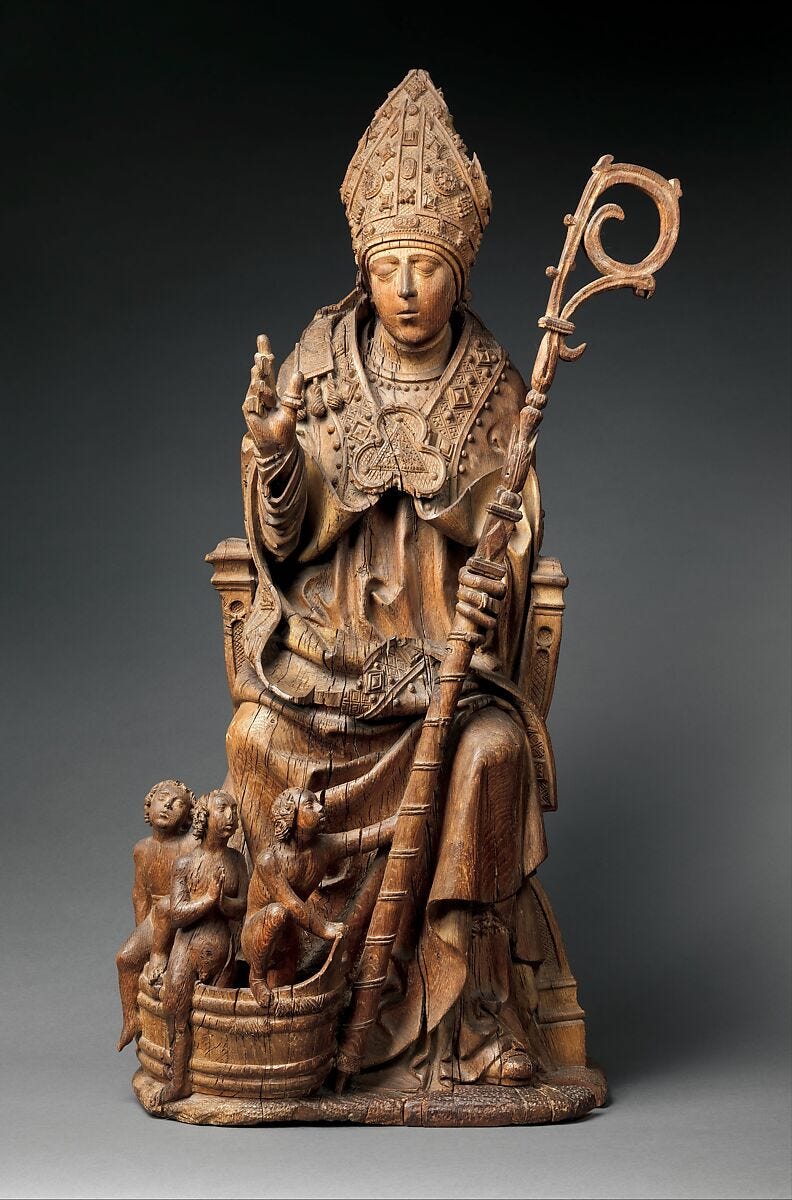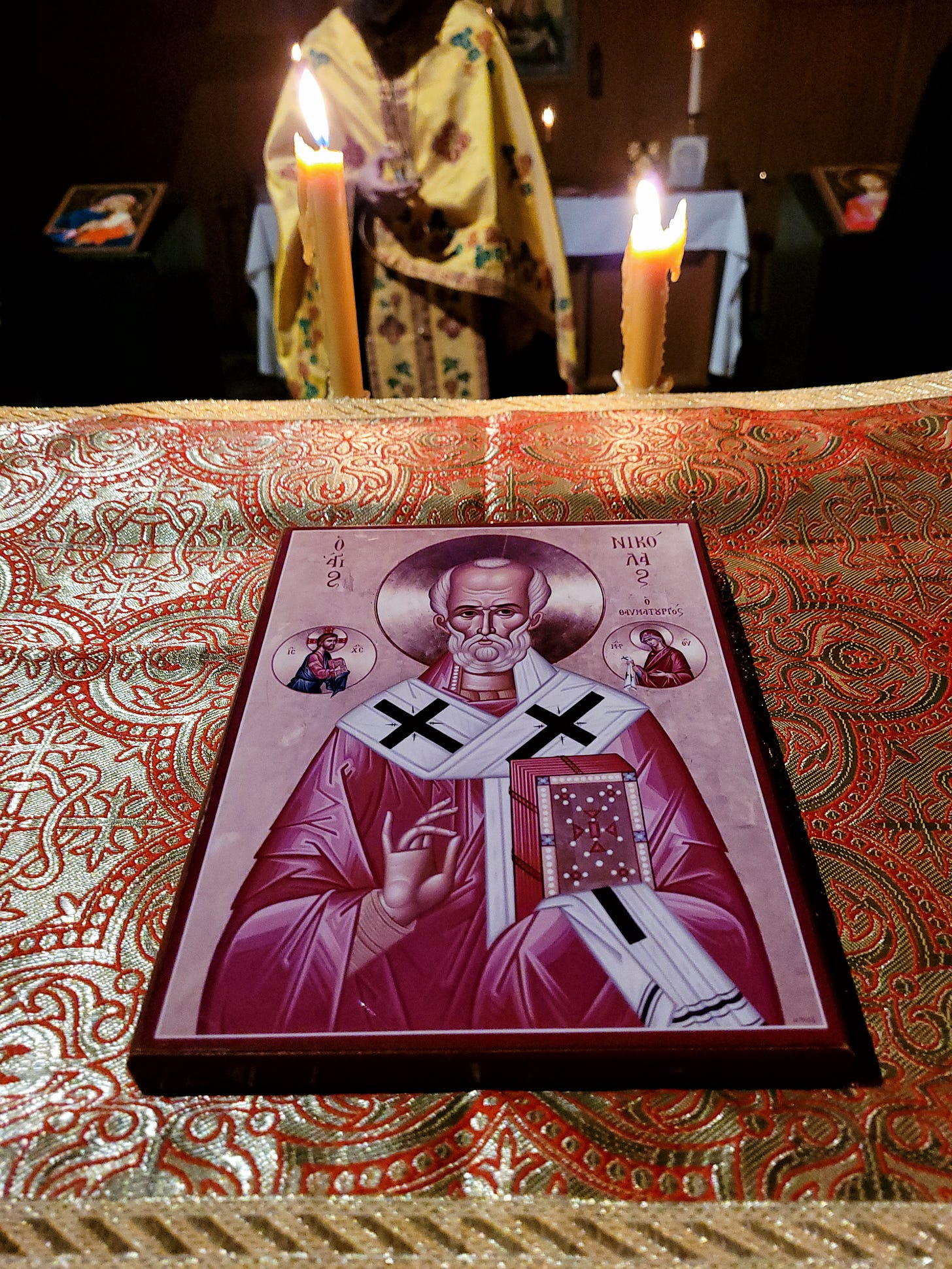What St. Nicholas Taught Me About Writing
Notes on poverty, creative generosity, and a very strange legend about pickled children...
It’s the feast of St. Nicholas, my name-day. I am sitting beneath a canopy of palm trees—it’s a tropical greenhouse I try to work in once a week or so for the natural light.
Outside, an asthmatic ghost of a cold snap. Wheezy, sallow, frigid. Through the greenhouse windows, a small tent encampment is visible across the park, an inadequate response to our local housing crisis.
The contrast is sharp enough to hurt: the solitude and warmth of my creative tasks against the raw immediacy of suffering. Why write? Why create at all in a world like this? Today, St. Nicholas—his life, his legends, and his miraculous legacy—helps me hold these questions with a little more grace.

The complicated persistence of a good story
I hate to break it to you, but we know surprisingly little about the historical St. Nicholas. No writings from his lifetime survive, and the earliest biographies date to nearly two centuries after his death. Did he attend the First Council of Nicaea (possibly) or slap Arius across the face while there (less likely)? Were his parents really victims of an epidemic, leaving him to give away his inheritance to the poor? We can’t say for sure—at least not with the certainty modern history demands. While he seems to have been a real figure—his tomb was already a known pilgrimage site within a century or two of his death—much of what we think we know about him is wrapped in legend.

This isn’t to minimize the holiness St. Nicholas leaves in his wake. When the Church glorifies a saint, they look for certain signs, or fruits, of the person’s holiness—local veneration, for example, or incorrupt relics, or miracles that occur near their grave or shrine. What if one further fruit of a saint’s legacy is that their stories, even as they are embellished over centuries, shape us into kinder people and cultures, inspiring us to perform our own quiet miracles of generosity?
Take one of the more unlikely (and frankly bizarre) tales told about St. Nicholas: a butcher during a famine was said to have trapped three children (or seminarians, depending on the version), killed them, and hid their remains in a barrel of pickling brine to sell as ham. Upon discovering all this, St. Nicholas (sorry to quote Wikipedia, here, but good grief:) “resurrected the pickled children by making the sign of the cross” over them.
Although it likely never happened (the account didn’t begin circulating until nearly a thousand years after St. Nicholas lived), this story left its mark. Frescoes and stained glass featuring Nicholas beside a barrel of children remained common in churches even as the story itself faded, leaving ordinary people to draw their own conclusions.

Connecting the barrel to their own trade, brewers began venerating St. Nicholas as their patron, while others sought his prayers as a protector of children.
As unhinged as this whole account is, there’s beauty here. Somehow, the convoluted path of this legend inspired new forms of connection and prayer, as if the sacred found a way to work through the cracks of a deeply flawed story. Brewers and others could see themselves in the life of this saint in ways they couldn’t before.
What amazes me is how the centuries-long game of telephone that is human tradition can twist a saint’s life almost beyond recognition—yet often in ways that invite more people into connection: with the saint, the sacred, and Christ’s call to feed the hungry, clothe the naked, and, well… not pickle the children. Perhaps this is its own kind of miracle: the way these distorted stories draw more souls toward God and help people see themselves as capable of bearing holiness.
Writing is its own kind of telephone game—no matter how carefully I choose my words, readers often find life-giving meaning I never intended. Over time, I’ve learned to let this be: to release control over how my words are understood and give thanks for the strange, wondrous ways God meets us in the mess of imperfect stories.
The connection to writing isn’t that we should craft the most fantastical stories to evoke the sacred. Instead, I’m struck by the parallels. There’s always a gap between my thoughts, the words I write, and what readers take from them. Writing is its own kind of telephone game—no matter how carefully I choose my words, readers often find life-giving meaning I never intended. Over time, I’ve learned to let this be: to release control over how my words are understood and give thanks for the strange, wondrous ways God meets us in the mess of imperfect stories.
Creativity as generosity
Among other things, St. Nicholas is revered for his habit of secret giving, especially to those most in need.
Among the earliest stories of St. Nicholas is one about creative generosity: hearing of a father forced into poverty, Nicholas secretly dropped sacks of gold through his window over three nights. This allowed the father to pay dowries for his daughters, saving them from exploitation.
When telling this story, we often focus on St. Nicholas’s virtuous choice to conceal his identity, which avoided drawing negative attention to the family he sought to help.
Generosity, like writing, often requires noticing the reality around us and responding to it in unique, imaginative ways that affirm others’ dignity rather than our own. Done well, it reshapes not just individual lives but entire cultures, inviting us into a vision of the world where even desolation holds the potential for hope.
As a writer, though, what strikes me in this tale is the creativity at work in St. Nicholas’s generosity. Dropping coins through a window wasn’t his only option to help this family, even anonymously, but it was a choice rooted in compassion and imagination. Meaningful generosity requires noticing the reality around us and responding to it in new, intentional, and sometimes imaginative ways in order to affirm others’ dignity rather than our own. Done well, it reshapes not just individual lives but entire cultures, inviting us into a vision of the world where even desolation holds the potential for hope.
What does this teach me about writing? Hard to pin it down to one thing, except that maybe the best kind of creativity is the kind that doesn’t seek an audience. And is intent on being generous. And isn’t afraid to have a little creative fun with that.

The best writing starts and ends with generosity—not the kind that’s just out to do a good deed or feel good about oneself, but the kind that’s willing to take in and bear witness and hold space for the reality of people’s suffering, and do something about it. Writing brings opportunities to practice generosity in so many ways, whether that’s through advocacy; supporting fellow creatives; speaking words of truth, humility, or hope; being willing to be silent; or simply—by sharing one’s own story—making room for others to share theirs, or at least realize they aren’t alone.
Conclusion
I’m not sure this has gotten me any closer to the dilemma I began with.
What I’ve remembered today is that the pursuit of holiness is always, among other things, a creative choice. Like writing, it begins with the willingness to ask: What do I, personally, have to offer? What does my neighbor need? And how do I bring these two things into connection? Even if it’s as simple as a gift card, a coat, or a story that might, somehow, change the world.
Perhaps the best creativity, like the best generosity, isn’t about control, but offering what we have—imperfect and incomplete—and trusting that God can work through the gaps.
Writing, like sainthood, is a curious blend of intention and unintended impact—a kind of telephone game that transmutes our broken efforts into something beautiful and helpful.
Both writing and holiness seem to do their best work in the spaces in between—between thought and word, intention and impact, knowledge and mystery, control and surrender. Nonetheless, they both require us to be active participants, as frail and faltering though we may be. They ask us to find a way to move beyond idle thoughts and theories to action. We will not be writers until we begin to put words on paper, and we will not be saints until we step out into the cold. ☙
Hi there! Are you looking for gentle yet effective ways to prioritize your writing life in the new year? I’ve got two new programs that are starting in January—check them out! I’ll share more next week, but here’s the info in the meantime:
Weekly Writers Meetup - Winter 2025 - Starts Jan 9!
Memoir Writing/Critique Circle (Use code EARLY2025 for 10% off until Dec 15)




This is so beautifully written. I just want to hold and reflect on so much of what you wrote here. Writing (and living) imperfectly while trusting God to do as He wishes with our writing (and our lives) can be such a challenge. Thankful for these insightful words of encouragement for future writers. I will be returning to learn from this again I am sure!
This is so good Nicole. I love how you have made us see the beauty and sanctity even in saintly legends that are likely not historical. And I love how you have compared this to writing, being a writer, and generosity.